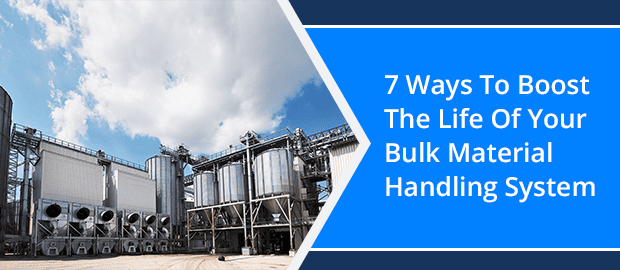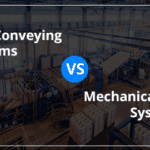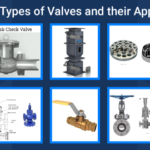Bulk materials transported with the help of material handing systems include solid materials that are dry, granular, or powdery such as cement, sand, stone, ores, minerals, chemicals, and food grains. A bulk material handling system refers to machinery, equipment, or devices that can efficiently move, store, and process large quantities of such materials. Handling bulk materials is a crucial aspect of industrial processes.
While material handling systems are created to handle the load of such bulk materials, like any other equipment and machinery, material handling systems will also face wear & tear over time. Although repairs & maintenance can extend the life of your bulk material handling system, they cannot completely prevent breakdowns. Special care & maintenance can extend the average lifespan of machines, reduce repair costs, and generate higher revenues.
Read on to know more about bulk material handling systems and simple methods to enhance their productive life.
Enhance Your Bulk Material Handling System’s Life
A] What Factors Cause Material Handling Systems To Degrade?
Bulk material handling systems experience various mechanical forces during their operation. The substantial weight of the materials they handle can impact their components over time. Friction at high-impact points in a machine can lead to abrasive wear, occasionally necessitating the replacement of components.
Machines operating at full capacity may experience friction, heat, and vibration, which can impact the machine’s longevity. These extreme temperatures can pose challenges to the optimal functioning of any bulk material handling system.
Machines are also subject to standard wear & tear even if they are not operating. Metals get oxidised due to the surrounding air (oxygen). Corrosion, being a natural process, can potentially affect the integrity of metals in machinery or equipment.
Let’s now understand how proper bulk material handling maintenance can prevent these problems and protect your machines.
B] Explore The 7 Methods To Boost The Life Of Your Bulk Material Handling System
1. Have Trained Employees
Letting unqualified or untrained personnel handle any machinery or equipment can cause multiple errors and oversight. The workers may inadvertently use them the wrong way or for the wrong purposes. There is a high chance of the machinery getting damaged, thereby affecting its productivity & working life.
Workplace safety is critical to any organisation. Not knowing how to operate a machine also poses a serious threat to the health & life of all employees around. A systematic training process ensures that the workers are well-equipped to handle the machinery with little risk of accidents and damage.
Apart from training, it is also important to assess & certify the employees’ capabilities to handle machines. Refresher training is essential whenever technology is upgraded. These measures ensure that the machines are used correctly with adequate safety measures in place. Thus you can ensure bulk material handling systems maintenance with a well-trained workforce.
2. Communicate With Your System Operators
Poor communication can be disastrous for heavy engineering industries. It is important to have a clear & open communication channel with the bulk equipment operators. The operators should closely observe the functioning of machines. The supervisors should talk to them every day and enquire whether they notice any unusual occurrences in the way these machines operate. This helps to keep the equipment under check and address problems before the situation gets out of control.
The operators should be trained to report the issues quickly and correctly. When equipment damage is reported as soon as it is spotted, it can limit the extent of damage and the consequent repair costs. Periodic safety meetings ensure that the operators are up-to-date with all the procedures and changes to their equipment. Clear communication helps to reduce human errors, save avoidable expenses, and keep the workplace safe.
3. Avoid Material Spillage
Material spillage is quite common in industrial belt conveyors. It refers to the material that escapes or spills off the conveyor. This is a usual occurrence at load and transfer points. But excessive spillage needs immediate attention.
The common causes of abnormal spillage include belt damage, belt misalignment, high-impact loading, and chute misalignment. Material spilling increases wear on the equipment, shoots up material loss, and curbs operational efficiency. You have to take urgent measures to prevent spillage & extend your bulk handling system’s work life.
Material spillage can be checked by an efficient conveyor system. The material flow has to be kept in line with the receiving conveyor. Well-aligned conveyors in good working condition can prevent spillage. Skirt boards and dust pick-off points can significantly cut down spillage. The chutes should be located properly and centrally above the loading zone.
Enhance Your Bulk Material Handling System’s Life
4. Have A Preventive And Predictive Maintenance Program
Having regularly scheduled maintenance of the bulk material handling system can prevent unexpected equipment breakdowns which affect productivity. Here, you fix the problems before they surface. There are several benefits of having a preventive maintenance program in place:
- It keeps the equipment operating at optimal efficiency.
- It saves the huge expenses associated with emergency repairs.
- It extends the productive life of the equipment.
A predictive maintenance program involves monitoring the condition and performance of the equipment during regular operations to avert possible breakdowns later. It is a good complement to a preventive maintenance program.
Predictive maintenance helps to predict and prevent impending equipment breakdowns. Close monitoring of bulk equipment through automated devices can provide real-time updates about their condition. You can then schedule corrective maintenance activities and the replacement of parts to minimise the frequency of machine failures.
5. Follow The Instructions Given By The Manufacturer
When it comes to equipment repair & maintenance, take the instructions of the original equipment manufacturer (OEM) as a commandment. The OEM is the expert who sets the standards on how to operate and maintain the machine.
Every piece of equipment is unique in terms of its design and make. Maintenance requirements cannot be uniform across brands & models. It requires a deep understanding of every system with regard to its internal workings & issues. A blanket approach of one-size-fits-all cannot be applied to every machine.
The OEM has the best insight into the system’s repair and maintenance procedure. Strict adherence to OEM guidelines on maintenance enhances the longevity of the equipment and prevents untoward expenses on repairs & replacement.
6. Replace And Repair If Damage Is Detected
Nothing lasts forever. Machine & equipment parts are no exceptions to this rule. Certain parts of the conveyor gradually show wear & tear. The rollers used to move weighted objects along the conveyor also wear out but not evenly. One side may wear out faster than the other. Only regular inspections can help you spot these problems.
It is imperative to replace the roller as soon as you notice it wearing out on one side. This can effectively prevent further damage to the surrounding rollers and the conveyor belt.
It is common for rollers to fail on a production line. It is advisable to have some spare rollers ready to replace the failed parts. This can prevent unnecessary interruptions to your production system. The spare rollers can instantly replace the damaged ones and save you precious time and money.
7. Don’t Overlook Smaller Issues
Do not ignore the minor but finer aspects of equipment maintenance. The biggest problems often start small. But they can acquire monstrous proportions over time. It is important to pay attention to small repairs and nip the problem in the bud. Ignoring the problem because it is not serious at the moment can be an invitation to disaster.
For instance, do not overlook the engine oil during inspections and presume it to be clean. Proper lubrication of machine parts is essential to avoid friction and enable smooth operations. But some dirt, sand, metal shards, or debris can easily spoil the lubricant. Certain microscopic particles are invisible to the naked eye.
A contaminated lubricant can damage components, cause unexpected breakdowns, and curtail the lifespan of the equipment. Production interruptions and higher energy consumption multiply your expenses.
Enhance Your Bulk Material Handling System’s Life
Conclusion
The material handling system is the backbone of industrial and manufacturing processes. Its significance grows manifold with the growth of your business. Simple timely bulk material handling system maintenance can extend its longevity, minimise downtime, enhance productivity, and streamline business operations.
The working life of a bulk material handling system can be increased with proper care and planning. Trained manpower, comprehensive maintenance programs, regular inspections, and strict compliance with OEM instructions play a key role in boosting the lifespan.
Proper maintenance & care of equipment protects your facility against significant repairs and potential breakdown. It is equally important to trust a reputed pneumatic conveyor manufacturer who offers a superior range of products along with a periodic maintenance program.



